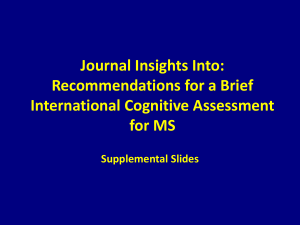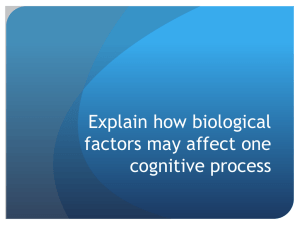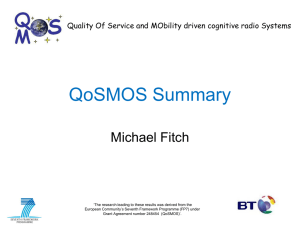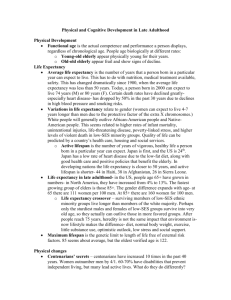You - Ashton Southard
advertisement
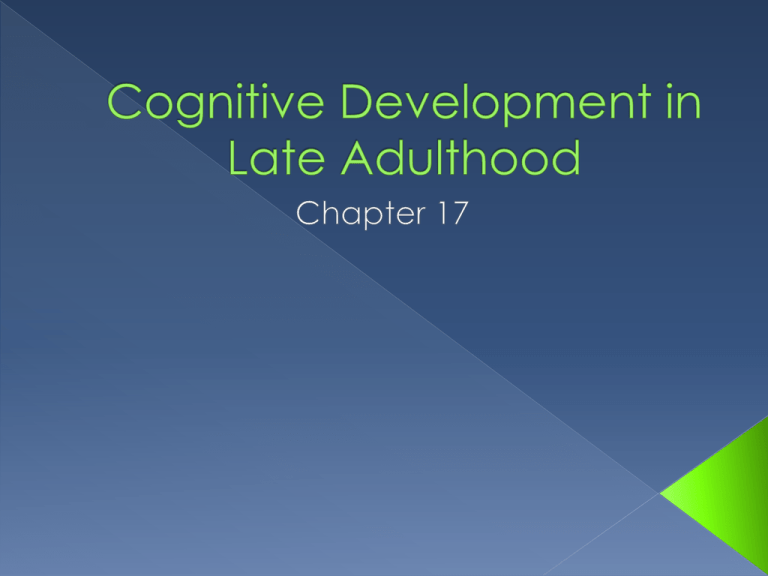
Research reveals greater individual variation in cognitive functioning in late adulthood than at any other time of life Decline in speed of processing is believed to affect many aspects of cognition in old age Reduced efficiency of thinking compromises attention, the amount of information that can be held in working memory, the use of memory strategies, and retrieval from long-term memory According to one view, elders who sustain high levels of functioning engage in selective optimization with compensation › They select personally valued activities to optimize returns from their diminishing energy › They also come up with new ways to compensate for cognitive losses Ex. An 80 year old concert pianist stated when asked how he had managed to sustain his talents at his age that He was selective: he played fewer pieces This enabled him to optimize his energy: he could practice each piece more He developed new, compensatory techniques for a decline in playing speed: ex. Before a fast passage, he played extra slowly, so the fast section appeared to his audience to move more quickly The chances for memory failure increase in older people as a result of: › › › › Taking in information more slowly Finding it harder to apply strategies Higher difficulty in inhibiting irrelevant information Higher difficulty in retrieving relevant knowledge from long-term memory Memory problems are especially evident on complex tasks › Due to a reduced capacity to hold material in working memory while operating on it Because older adults take in less about a stimulus and its context, their recall is reduced in relation to that of younger people › Ex. When watching a movie older adults… Retain fewer details because of slower cognitive processing Attend poorly to context – where they saw the movie and who went with them – due to their reduced working memory capacity because they can hold on to as many pieces of information at once › Ex. Older adults sometimes cannot distinguish an experienced event from one they imagined Recognition memory suffers less in late adulthood because: › It is a fairly automatic type of memory that demands little mental effort › A multitude of environmental supports for remembering are present Implicit memory – automatic form of memory without conscious awareness › In a typical implicit memory task, you would be shown a list of words, then asked to fill in a word fragment (such as t—K). You would probably complete the sentence with a word you had just seen (task) rather than another word (took or teak) Without trying to do so, you would engage in recall Age differences in implicit memory are much smaller than in explicit, or deliberate, memory Memory that depends on familiarity rather than on conscious use of strategies is also largely spared in old age › Ex. The memory problems elders report – for names of people, places where they put important objects, directions for getting from one place to another, and appointments and medication schedules – all place substantial demands on their more limited working memories The memory deficits just described are part of a general, age-related decline in binding information into complex memories › Associative memory deficit – difficulty creating and retrieving links between pieces of information › Ex. Where you put your keys in your purse and where you parked the car Providing older adults with repeated presentations of information to be learned and more memory cues improves their associative memory › Ex. To associate names with faces, memory improves with mention of relevant facts about those individuals (they were wearing a funny hat or they had long red hair) When older adults are directed to use the memory strategy of elaboration during both study and retrieval, the difference between young and old adults nearly disappears › Clearly, elders’ associative deficits are greatly affected by lack of spontaneous use of strategies that help bind information together into integrated wholes Remote memory – very long-term recall › Ex. Telling childhood stories to grandkids Although older people often say that their remote memory is clearer than their memory for events, research does not support this conclusion In several studies, adults ranging in age from 20-79 were asked to recall names of grade school teachers and high school classmates and Spanish vocabulary from high school (information very well learned in early life) › Memory declined rapidly for the first 3-6 years, then changed little for the next 20 years, after which additional modest forgetting occurred › People between ages 50-90 recall both remote and recent events more frequently than intermediate events › With recent events mentioned most often › Events occurring early in life, during times of rapid change and new experiences that are possibly significant to identity and personality formation, just stand out more Why? Prospective memory – refers to remembering to engage in planned actions in the future › The amount of mental effort required determines whether older adults have trouble with prospective memory › Whereas other types of memory refer to events from the past prospective memory refers to events in the future Ex. Remembering a dinner date may be challenging for an elderly adult because he/she typically has dinner with his/her daughter on Thursday nights at 6pm but this time dinner was set for Tuesday at 7:15pm In trying to remember a future activity › Younger adults rely more on strategies like rehearsal › Older adults rely more on external aids to memory › Use of external aids in compensation for memory seems to be the largest reason older adults’ deficits in prospective memory seen in the laboratory, do not actually effect them in everyday life Ex. Repeating over and over “Remember to bring my text book” the night before class Ex. Placing a friend’s scarf that needs to be returned next to the door the night before seeing the friend Like implicit memory, language comprehension changes little in late life › As long as partners do not speak too quickly and elders are given enough time to process written text accurately 2 aspects of language production do show agerelated losses › Retrieving words form long-term memory › Planning what to say and how to say it As with memory, older adults develop compensatory techniques for their language production problems › They speak more slowly and simplify their grammatical structures so they can devote more effort to retrieving words and organizing their thoughts › They often compensate by representing information they want to communicate in terms of gist rather than details Aging brings both deterioration and adaptive changes in problem solving The problematic situations the elderly encounter are often different from those experienced at earlier ages › Ex. After retirement, older adults do not have to deal with workplace problems, their children are typically grown and living on their own, and their marriages have endured long enough to have fewer difficulties As long as they perceive problems as under their control and important, elders are active and effective at solving them › Findings indicate that older adults make quicker decisions about whether they are ill and seek medical care sooner than younger people › Older adults often consult others for advice about everyday problems, and couples more often collaborate in problem solving A wealth of life experience enhances the story telling and problem solving of the elderly Life experience also underlies a capacity believed to reach its height in old age… › Wisdom – breadth and depth of practical knowledge, ability to reflect on that knowledge in ways that make life more bearable and worthwhile, emotional maturity, and an altruistic form of creativity Not surprisingly, cultures around the world assume that age and wisdom go together › But research paints a different picture The most extensive research to date on development of wisdom › Adults ranging in age from 20-89 responded to uncertain real-life situations Ex. What to consider and do if a good friend is about to commit suicide or if, after reflecting on your life, you discover that you have not achieved your goals › Responses were rated for 5 factors of wisdom 1. Knowledge about fundamental concerns of life, including human nature, social relations, and emotions 2. Effective strategies for applying that knowledge to making life decisions, handling conflict, and giving advice 3. A view of people that considers the multiple demands of their life contexts 4. A concern with ultimate human values, such as the common good, as well as respect for individual differences in values 5. Awareness and management of the uncertainties of life – that many problems have no perfect solution › Results revealed that age is no guarantee of wisdom A small number of adults of diverse ages ranked among the wise But type of life experience made a difference (ex. People with experience in human services who had training in solving human problems tended to attain high wisdom scores) In addition to age and life experience, having faced and over come adversity appears to be an important contributor to late-life wisdom Compared to their agemates, older adults with the cognitive, reflective, and emotional qualities that make up wisdom are typically: › Better educated and physically healthier, forge more positive relations with others, have higher psychological well-being, and are more open to experience A mentally active life – above-average education, stimulating leisure activities, community participation, and flexible personality – predicts maintenance of mental activities into advanced old age In late adulthood, health statuses becomes an increasingly strong predictor of intellectual performance › But this relationship may be exaggerated by the fact that brighter adults are more likely to engage in health-protecting behaviors, which postpone the onset of serious disease Retirement also affects cognitive change, both positively and negatively When people leave routine jobs for stimulating leisure activities, outcomes are favorable › In contrast, retiring from a highly complex job without developing challenging substitutes accelerates intellectual declines › As they age, elders’ scores on cognitive tasks show larger fluctuations from one occasion to the next › This trend accelerates in the 70s and is associated with cognitive declines Terminal decline – refers to marked acceleration in deterioration of cognitive functioning prior to death › Including becoming less active, more withdrawn, declines in cognitive skills › Some studies find that it is limited to a few aspects of intelligence Others find that it occurs generally, across many abilities › Findings also differ greatly in its estimated length Some report that it lasts only 1-3 years Others that it extends for as long as 14 years The average estimate is 4-5 years prior to death The Adult Development and Enrichment Project (ADEPT) is the most extensive cognitive intervention program conducted to date › By using participants in the Seattle Longitudinal Study, researchers could assess the effects of cognitive training on long-term development › Intervention began with adults over age 64 Some of whom had maintained their scores on 2 mental abilities (inductive reasoning and spatial orientation) over the previous 14 years Others who had shown declines over the previous 14 years › After just 5 1-hour training sessions in relevant cognitive skills, 2/3 of the participants improved their performance › Gains for decliners were dramatic: 40% returned to the level at which they had been functioning 14 years earlier Another large-scale intervention study is the ACTIVE (Advanced Cognitive Training for Independent and Vital Elderly) › Elders trained by researchers similarly showed an immediate advantage in trained skills over controls who were not trained Trained skills included speed of processing, memory, or reasoning › 5 years after the intervention, training was associated with reduced declines in general health and enhanced ability to engage in social and leisure pursuits Older adults need much the same competencies that younger adults need to live in our complex, changing world › Communicating effectively through spoken and written systems, locating information, sorting through it, and selecting what is needed, using math strategies, etc. In addition, the elderly also need to develop new, problem-centered coping strategies (ways to sustain health and operate their households efficiently and safely) and updated vocational skills for those who continue to work Participation of the elderly in continuing education has increased substantially over the past few decades › Successful programs include: A wide variety of offerings responsive to the diversity of senior citizens Teaching methods suited to their developmental needs Elderhostel programs hosted by local educational institutions combine stimulating 1-3 week courses with recreational pursuits › Some programs make use of community resources through classes on local ecology or folk life › Others involve travel abroad › Still others focus on innovative topics and experiences Ex. Writing one’s own life story, discussing contemporary films with screenwriters, whitewater rafting, Chinese painting and calligraphy, and acquiring French language skills Other similar educational programs have sprung up, including Osher Lifelong Learning Institutes, located on college campuses around the U.S. Community senior centers often provide inexpensive offerings related to everyday living › Which attract more low-SES people than more expensive programs like Elderhostel Elders in continuing education report a rich array of benefits › Learning interesting facts, understanding new ideas in many disciplines, making new friends, and developing a broader perspective on the world Seniors also come to see themselves differently › Abandoning their own stereotypes of aging when they realize adults in late life can still engage in complex learning In Elderhostel, participants with the least education report learning the most › Which shows the importance of and argument for recruiting less economically privileged people into these programs

